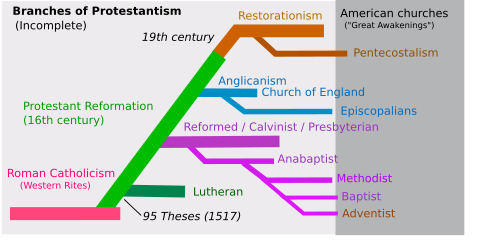Protestantism

Welcome to the study of Protestantism
editAs you may or may not know, there are many flavors of Protestants w:Protestant_reformers. What you may not be aware of is that most people not associated with the Roman Catholics are, in fact, Protestants. This wiki serves to be just the briefest of overviews of Protestantism. And, depending on how you view church history, it can be very exciting -- with lots of twists and turns. Along with the varied twists and turns, there are many players such as the more popular Luther, Calvin and Zwingli, along with scores of lesser-knowns who each played their part in moving away from the perceived limitations of Roman Catholicism. What I hope to see here is sort of a "layperson's guide" to Protestantism, not a lot of lengthy discources or debates on the various theologies. I would like this to start with a short history of the church, then move into more of the regional history of Europe and finally into the various "flavors" themselves.
A short history of the Church
editArguably, the start was Johannes Gutenberg with his printing press attempting to get the gospel into the hands of the people in their own language. As we will see, other people came along with their ideas as to what Christianity means for the people. Some of the perceived limitations include the following:
Regional history of the Reformation
editSome areas of Europe stayed Roman Catholic, some tried compromising and still more broke as far away as possible from the previous flavor. These splinters are where we get a lot of our various denominations today. Some of the other denominations formed as these earlier groups had widely differing views on biblical interpretation and the training/utilization of the laity.
The regional breakdown is as follows:
- Scotland -- John Knox (1505-1572) w:John Knox
- France -- John Calvin (July 10, 1509 – May 27, 1564) w:John_Calvin
- England -- John Wycliffe, Henry VIII, continued by Elizabeth I
- Germany -- Martin Luther (November 10, 1483 – February 18, 1546)
If Protestantism were ice cream ....
editIt does not take much more than a casual observation to see that there are myriad "flavors" of Protestantism. Some groups seem to have centered around personalities. Others seem to have a certain view towards certain Scriptures. Still others found the limitations of previous "flavors" a little too insurmountable and chose to form their own flavor.
Traits of Protestantism
editCreated after Luther's "protest" against the Catholic Church, Protestantism has had plenty of time to diversify. While the term "Protestant" is of a historical nature (representing those religions which broke away from Catholicism, or which are descended from them), modern Protestantism tends to share certain traits.
One example is that most—if not all—protestant groups believe that man can have a personal relationship with Jesus Christ (as apposed to the Catholic notion of having a priest intercede on one's behalf). The doctrine of Sola Scriptura as introduced by Martin Luther is very common to most protestant denominations. Sola Scriptura represents a belief that the Bible is the only source for theological inquiry. Some Protestants interpret this to mean that the Bible is the inerrant word of God and the final authority on all theological matters, while others allow for less literal understandings of scripture while still looking to it as a theological norm. Once again, this was a push against the Roman Catholic notion of the Magisterium or Teaching Office of the Church, which relies on clerical interpretative authority in matters of doctrine.
Perhaps a list...
editHere are some pages based upon specific doctrines (denominations) within Protestantism.
- Adventist
- Anabaptist - Amish, Brethren, Hutterite, Mennonite
- Baptist
- Religious Society Of Friends (Quakers)
- Congregationalism
- Lutheranism
- Methodism
- Pentecostalism
- Presbyterianism
- Puritans
- Revivalism
- Church of England
- Evangelicalism - however, Evangelicalism is not strictly to be classed simply with the others on this list as there are people of many denominations who could describe themselves as Evangelical. (Note also that it is also not restricted merely to Protestantism: though this is the division of the church it is most commonly associated with, it is possible also to be a Roman Catholic Evangelical.)
- New Thought Protestantism:
- Christian Science
- Unity School of Christianity